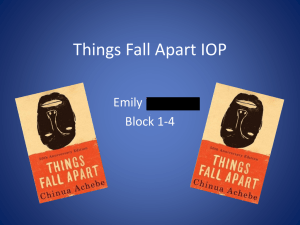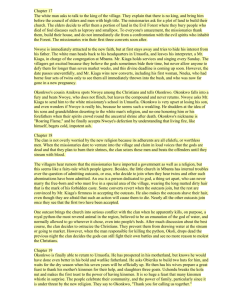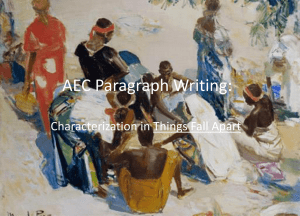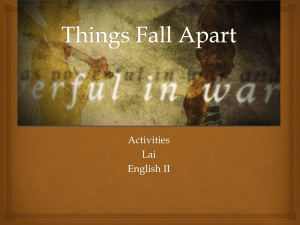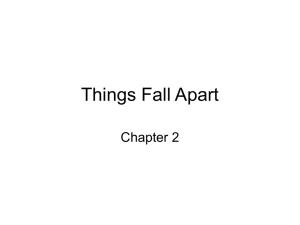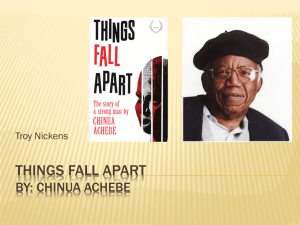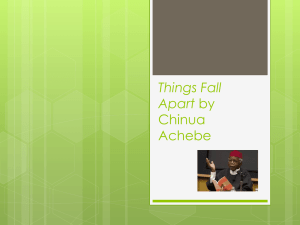Daily Slides for Things Fall Apart
advertisement
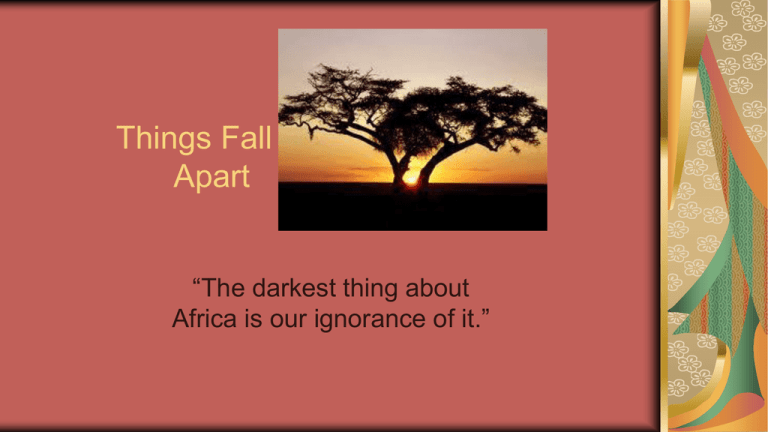
Things Fall Apart “The darkest thing about Africa is our ignorance of it.” Journal: Change??? Name ways in which you’ve changed (physically or mentally) since September. What have you lost or gained from Change? Is Change good or bad? Explain your answer. To what extent do you agree with the saying, “The only constant is change itself”? Essential Question: Change Do people really change? What happens if people don’t change? How much Change is considered “Progress”? Is there such a thing as “too much Change”? THINGS FALL APART Chinua Achebe (‘chin-wah uh-’chay-bay) The Novel Published in 1958 One of most widely read literary works by a black African Books teach Past Encourages new reflections on the present Novel set in 19th century Goal: To show the readers the richness of that society The Author Born November, 1930 Ogidi, Nigeria Parents both Christians Father evangelist and teacher Changed his name from Albert to Chinua during college Writer, professor, Ministry of Information NIGERIA IBO (E’ BO) CULTURE and HISTORY Achebe’s ancestors – Ibos Iboland – not a nation Large group of related tribes located on east side of Nigeria between Niger and Cross rivers Tribes shared Common language Beliefs Traditions CULTURE cont’d Beliefs Polytheism Ancestor worship Reincarnation Oracles Priests and priestesses “Chi” = personal god or spirit CULTURE cont’d Traditions Strong connection to Family Tribe Village/community Education and learning Skilled with language Skilled – public speaking – Use of proverbs - admired HISTORY cont’d Missionaries Increased in Africa in 18th century Most coast and river areas 1960s – Ibo tribe tried to secede from Nigeria and become BIAFRA Result – civil war – nearly wiped out Ibo STRUCTURE OF NOVEL Three parts Part One – chapters 1-13 Part Two – chapters 14-19 Part Three – chapters 20-25 Essential Questions: What “falls apart” in each part of the novel? If the only constant is change, how much change is too much? CHARACTERS Okonkwo – main character; clan leader in Umuofia. Unoka – Okonkwo’s father Ogbuefi Ezeugo Ikemefuna – boy given to Okonkow by a neighboring village Nwoye – Okonkwo’s oldest son Mr. Brown – first white missionary to travel to Umuofia Places Umuofia - “people of the forest” Mbaino Important Terms Italics Often defined through context clues “kola nut” – mild narcotic;hospitality Cowries – shell used as money Yams Yam-cult Dance Mask The End Things Fall Apart Monday, Oct. 13th Agenda: 1. “The Dangers of a Single Story.” 2. Listening Quiz. “Ted Talks” – The Danger of a Single Story Get out your Logbook and title a new page: “The Danger of a Single Story.” Copy down the following two questions on the page (leave enough space – about 4-5 lines – between each question): Why do stories matter? What are the “unintended consequences” of only having a “single story?” As you listen (and follow along with the transcript), copy down phrases and statements that Chimamanda Adichie gives during her presentation. What is her message? Why is this an important idea to keep in mind as we read, Things Fall Apart? On the back of the page of your logbook, write a paragraph that answers the four questions above. THE SECOND COMING (1919) by William Butler Yeats Turning and turning in the widening gyre The falcon cannot hear the falconer; Things fall apart; the centre cannot hold; Mere anarchy is loosed upon the world, The blood-dimmed tide is loosed, and everywhere The ceremony of innocence is drowned; The best lack all conviction, while the worst Are full of passionate intensity. Surely some revelation is at hand; Surely the Second Coming is at hand. The Second Coming! Hardly are those words out When a vast image out of Spiritus Mundi Troubles my sight: a waste of desert sand A shape with lion body and the head of a man, A gaze blank and pitiless as the sun, Is moving its slow thighs, while all about it Wind shadows of the indignant desert birds. The darkness drops again but now I know That twenty centuries of stony sleep Were vexed to nightmare by a rocking cradle, And what rough beast, its hour come round at last, Slouches towards Bethlehem to be born? Things Fall Apart Monday, Oct. 13th Agenda: 1. Things Fall Apart Prep 2. Read Ch. 1. Journal Entry: In the Entry section of your logbook, title a new page: “TFA Journals” and respond to the following prompt: Based on your notes from last week, and the title of the novel (Things Fall Apart), PREDICT what you think will happen in this story. Provide a beginning, middle (with conflict and climax) and resolution/end. Explain why you’ve come to this conclusion. Vocabulary: Chapters 1-4 Wily: sly, tricky, deceitful Improvident: lacking foresight; neglecting to provide for future needs Proverb: a short, popular saying, that expresses a commonplace truth or useful thought Discern: to perceive by sight or some other sense; to distinguish mentally Uncanny: beyond ordinary or normal; mysterious; extraordinary Incipient: in an initial or beginning stage Abomination: anything greatly abhorred or disliked Contemptible: deserving of hatred; despicable Purpose for reading. . . What do we find out about Okonkwo in the first chapter? Flag passages that you think are significant. Homework: Finish reading Ch. 1-2 Things Fall Apart Weds/Thurs, October 15/16th AGENDA: 1. READ CHAPTERS 2 – 4 IN CLASS 2. PROVERBS ASSIGNMENT HOMEWORK: CH. 5-6 DUE FRIDAY Annotations: Changes Traditions that are ‘evolving’ People that are adapting Beliefs “Progress” Okonkwo’s Journey: How is the protagonist Dynamic? What’s his goal/hopes? Proverbs What proverbs are new? What proverbs are ‘familiar’? Any proverbs that coincide with Okonkwo’s journey? Things Fall Apart Friday, October 17th AGENDA: 1. READ CHAPTER 7 IN CLASS HOMEWORK: CH. 8-10 DUE MONDAY Things Fall Apart Monday, October 20th AGENDA: 1. PROVERBS ASSIGNMENT HOMEWORK: CH. 11-12 DUE FRIDAY In your logbook: “Proverbs” Proverb: a short, popular saying, that expresses a commonplace truth or useful thought “Among the Ibo the art of conversation is regarded very highly, and proverbs are the palm-oil with which words are eaten” (7). Group Assignments: Group #1: A chain is only as strong as its weakest link. Group #2: A friend in need is a friend indeed. Group #3: A leopard cannot change its spots. Group #4: A penny saved is a penny earned. Group #5: A rolling stone gathers no moss. Group #6: Absence makes the heart grow fonder. Group #7: Good things come to those who wait. Proverbs, continued Working with your groups. . . On the back of your poster, explain the “truth” within each proverbs that are given to each group. What is the lesson that is being given? What is a familiar proverb from the United States? What virtue embodies the proverb? On the Front of your poster, copy the proverb and then create an illustration of it. A picture that illustrates the proverb. -ORA symbolic representation of the truth within the proverb. Things Fall Apart Tuesday, October 21st AGENDA: 1. VOCAB. FOR 5 – 7 2. PROVERBS SHARE OUT 3. CH. 13~ CLOSE STUDY HOMEWORK: CH. 14-16 Vocabulary Deity (n.): a god or supreme being Revel (v.): to make merry; indulge in boisterous festivities Disembody (v.): to free the soul or spirit from a body Feign (v.): pretend; to imitate deceptively Emissary (n.): a representative sent on a mission or errand Distill (v.): to extract the essential elements of Harbinger (n.): a person sent in advance to announce the approach of another; anything that foreshadows a future event Copiously (adv.): abundantly, profusely, lavishly Effeminate (adj.): having traits traditionally considered feminine Things Fall Apart Wednesday, October 22nd AGENDA: 1. READING QUIZ FOR PART 1 2. CLOSE STUDY FOR CH. 13 AND 16 HOMEWORK: CH. 17-19 Close Study Stems for questions: Diction: • • • • • Author's Purpose: • Why do you think (the event) occurs? What is the denotation of _______? • Why does the author give / or doesn't give What is the connotation of _______? details? Why is it a good word here? • Imagine _(event)_______. How would What is the point of saying _______? you feel if you watched this happen? Why do you think the author used ____? Figurative Lang: Others: • Predict ...... • What image is created with (a word or phrase)? • Infer the meaning of ....... • What is the point of describing ________ as ____________? • Why does the author use personification of __________? Things Fall Apart Thursday, October 23rd AGENDA: 1. IN CLASS DISCUSSION OF PART 2 2. CLOSE READING OF CH. 16 HOMEWORK: CH. 20-22 Close Study: “Nwoye’s Conversion” Read the final paragraph of Chapter 16 (pg 147). Today, we’re working together to complete a close study ‘on our own’. For each row of the matrix, you will be asked to choose a passage (the Evidence), how we’ll analyze it (the Question) and the resulting analysis (the Answer). Evidence / “Chunk” of Text 1. “But there was a young lad who had been captivated.” Questions / What are you elaborating on or explaining? The word “captivate” has multiple denotations. Copy at least 2 definitions. Answers / Analysis Close Study: “Nwoye’s Conversion” Read the final paragraph of Chapter 16 (pg 147). Today, we’re working together to complete a close study ‘on our own’. For each row of the matrix, you will be asked to choose a passage (the Evidence), how we’ll analyze it (the Question) and the resulting analysis (the Answer). Evidence / “Chunk” of Text Questions / What are you elaborating on or explaining? 2. “The hymn about brothers What “question” has been who sat in darkness and “haunting” Nwoye? in fear seemed to answer a vague and persistent question that haunted his young soul. . .” Answers / Analysis Close Study: “Nwoye’s Conversion” Read the final paragraph of Chapter 16 (pg 147). Today, we’re working together to complete a close study ‘on our own’. For each row of the matrix, you will be asked to choose a passage (the Evidence), how we’ll analyze it (the Question) and the resulting analysis (the Answer). Evidence / “Chunk” of Text 3. “. . .the question of the twins crying in the bush and the question of Ikemefuna who was killed.” Questions / What are you elaborating on or explaining? What do the “twins crying in the bush” have in common with “Ikemefuna who was killed”? Answers / Analysis Close Study: “Nwoye’s Conversion” Read the final paragraph of Chapter 16 (pg 147). Today, we’re working together to complete a close study ‘on our own’. For each row of the matrix, you will be asked to choose a passage (the Evidence), how we’ll analyze it (the Question) and the resulting analysis (the Answer). Evidence / “Chunk” of Text 4. “He felt a relief within as the hymn poured into his parched soul.” Questions / What are you elaborating on or explaining? What is the denotation of the word “parched”? Why does Achebe use this word to describe Nwoye’s soul? What does it tell us about Nwoye? Answers / Analysis Close Study: “Nwoye’s Conversion” Read the final paragraph of Chapter 16 (pg 147). Today, we’re working together to complete a close study ‘on our own’. For each row of the matrix, you will be asked to choose a passage (the Evidence), how we’ll analyze it (the Question) and the resulting analysis (the Answer). Evidence / “Chunk” of Text 5. “The words of the hymn were like the drops of frozen rain melting on the dry palate of the panting earth.” Questions / What are you elaborating on or explaining? Explain this simile. How is the hymn like drops of rain on the “dry … panting earth”? Answers / Analysis Close Study: “Nwoye’s Conversion” Read the final paragraph of Chapter 16 (pg 147). Today, we’re working together to complete a close study ‘on our own’. For each row of the matrix, you will be asked to choose a passage (the Evidence), how we’ll analyze it (the Question) and the resulting analysis (the Answer). Evidence / “Chunk” of Text 6. “Nwoye’s callow mind was greatly puzzled.” Questions / What are you elaborating on or explaining? What is the denotation of the word, “callow”? What does this word tell us about Nwoye? Answers / Analysis Close Study: “Nwoye’s Conversion” Read the final paragraph of Chapter 16 (pg 147). Today, we’re working together to complete a close study ‘on our own’. For each row of the matrix, you will be asked to choose a passage (the Evidence), how we’ll analyze it (the Question) and the resulting analysis (the Answer). Evidence / “Chunk” of Text 7. “Nwoye’s callow mind was greatly puzzled.” Questions / What are you elaborating on or explaining? If the hymn answers his questions why is Nwoye “puzzled”? Answers / Analysis Close Study: “Nwoye’s Conversion” Read the final paragraph of Chapter 16 (pg 147). Today, we’re working together to complete a close study ‘on our own’. For each row of the matrix, you will be asked to choose a passage (the Evidence), how we’ll analyze it (the Question) and the resulting analysis (the Answer). Evidence / “Chunk” of Text 8. Entire Passage Questions / What are you elaborating on or explaining? There are more than 90 paragraphs in last night’s reading. Why is this one significant enough to study closely? -OR- How does this passage compare to the Close Study of Obierika? Answers / Analysis Things Fall Apart Friday, October 24th AGENDA: 1. “HOW HAVE THINGS FALLEN APART?” HOMEWORK: CH. 23-24 How Have Things Fallen? ON the next available page of the Entry Section of your logbook, create an entry named: Changes On the page, create a web Graphic Organizer, with “CHANGE” in the middle. One strand is “Okonkwo”, two others are “Obierika” and “Nwoye”, a fourth “Society” and the last is “others.” Okonkwo Obierika Change Nwoye Other Society Things Fall Apart Monday, October 27th AGENDA: 1. JOURNAL AND VOCAB. 2. CH. 25 “THE CENTRE CANNOT HOLD” 3. SOCRATIC SEMINAR PREP Journal Entry: On a new page of your journal, create the page “Things Fall Apart” Journal: Then answer the following prompts: 1. “How does Oberieka’s thinking and Nwoye’s Conversion demonstrate the theme of change in Things Fall Apart?” 2. “Is Okonkwo an example of change? Why or Why Not?” Vocabulary Guttural (adj.): of or relating to the throat; having a harsh, grating quality Approbation (n.): official approval Calamity (n.): a great misfortune or disaster; adversity, misery Miscreant (n./adj.): villain, evildoer; villainous, evil Adherent (n./adj.): supporter, follower; sticky, clinging; bound by contract or other formal agreement Emanation (n.): something that flows out of another source; the act of emitting or issuing forth Revere (v.): to regard with respect and awe; to venerate **Idolatrous** (adj.): blindly adoring "Quick" Discussion: Is Okonkwo "Dynamic”? Or How is Okonkwo a dynamic character? What might this imply for his character and the topic of 'change'? Is Okonkwo “Static”? How is Okonkwo static? How would this characteristic effect Okonkwo's life? Overall, is Okonkwo a good man? How do you think he'll react in this last chapter? How does the Tragic Cycle (Sophrosyne, Harmatia, Nemesis, Wisdom) play a part in Things Fall Apart? Socratic Prep: On a separate sheet of paper, copy the follow questions down. For tomorrow’s Socratic Seminar, come with your answer (opinion) to the following questions, along with textual support, evidence, quotes, etc…. 1. Is Oberieka right, when he claims that Okonkwo “is a great man?” Why or why not? Consider: What is your definition of ‘Greatness’? 2. Why does Achebe end the novel with the District Commissioner’s narration? 3. Who is MOST to blame for ‘things falling apart’? 4. What is the better way to confront change: Resistance or Adaptation? Consider: What is the ultimate goal: Survival? Standing up for what you believe in (martyrdom)? Your personal legacy? Improving the world for others? Things Fall Apart Tuesday, October 28th AGENDA: 1. SOCRATIC SEMINAR Socratic Seminar (A): Use your Socratic Prep work from yesterday to take notes on today’s Seminar. You will be turning this in as well as the Seminar Summary Paragraph. 1. Is Okonkwo “a great man?” Why or why not? 2. Why does Achebe end the novel with the District Commissioner’s narration? What is the connection with this final chapter and Adichie’s “Danger of a Single Story”? 3. Who is MOST to blame for ‘things falling apart’? 4. What is best: To Adapt or to Resist? WHY? 5. Summary Paragraph: What is the Lesson that Achebe is trying to teach us with this novel? Use the discussion points to support your answer. “Defeat” • Kahlil Gibran (January 6, 1883 – April 10, 1931) was a Lebanese-American artist, poet, and writer. • Born in the town of Bsharri in the north of modern-day Lebanon (then part of Ottoman Mount Lebanon), as a young man he immigrated with his family to the United States, where he studied art and began his literary career, writing in both English and Arabic. • In the Arab world, Gibran is regarded as a literary and political rebel. • His romantic style was at the heart of a renaissance in modern Arabic literature, especially prose poetry, breaking away from the classical school. In Lebanon, he is still celebrated as a literary hero. • He is chiefly known in the English-speaking world for his 1923 book The Prophet, (where the poem “Defeat” is found) an early example of inspirational fiction including a series of philosophical essays written in poetic English prose. • Gibran is the third best-selling poet of all time, behind Shakespeare and Lao-Tzu. “Defeat,” By Kahlil Gibran (1883-1931) Defeat, my Defeat, my solitude and my aloofness, You are dearer to me than a thousand triumphs, And sweeter to my heart than all world-glory. Defeat, my Defeat, my self-knowledge and my defiance, Through you I know that I am yet young and swift of foot And not to be trapped by withering laurels. And in you I have found aloneness And the joy of being shunned and scorned. Defeat, my Defeat, my shining sword and shield, In your eyes I have read That to be enthroned is to be enslaved, And to be understood is to be leveled down, And to be grasped is but to reach one’s fullness And like a ripe fruit to fall and be consumed. Defeat, my Defeat, my bold companion, You shall hear my songs and my cries and my silences, And none but you shall speak to me of the beating of wings, And urging of seas, And of mountains that burn in the night, And you alone shall climb my steep and rocky soul. Defeat, my Defeat, my deathless courage, You and I shall laugh together with the storm, And together we shall dig graves for all that die in us, And we shall stand in the sun with a will, And we shall be dangerous. Regarding “Defeat”: What is the Topic of the poem? What is the Theme? What parts of the poem would Okonkwo agreed with? What parts did Okonkwo fail to understand? What is the lesson that Okonkwo and all of us need to understand about ‘defeat’? Socratic Questions for “Defeat” 1. What is the Narrator of the poem’s attitude towards defeat? 2. What is the TONE? What are some examples of diction (word choice) or imagery that develop the tone? 3. Do you believe that Okonkwo could have been the narrator in the poem, and learned to embrace defeat? Support your answer with evidence from the novel AND the poem. 4. In our other Novels and texts that we’ve read throughout the year, what other characters cold have said what this poem does?
